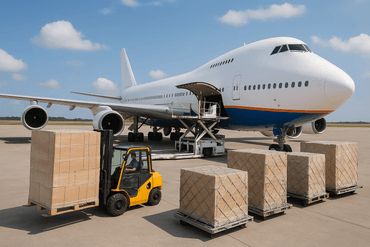
Import from the UK: Shipping tips



There’s currently a certain level of apprehension that surrounds trade in and out of the UK — much of it a result of the ongoing Brexit negotiations. At the time of writing, the Brexit deadline, initially set for 29 March 2019, has been postponed to 31 January 2020.
Despite its current political predicament, the United Kingdom remains the world’s fifth-largest economy and the 10th largest export economy with much to offer.
The latest trade figures from the country show goods exports from the UK grew approximately $5.57 billion in the third quarter of 2019 to $116 billion, marking a five percent increase from the previous quarter. GDP growth has also rebounded slightly from the 0.2 percent contraction in the second quarter to a 0.3 percent growth in the third.
With such potential, the UK remains an attractive market to trade with. If you’re looking to import from the United Kingdom, here’s what you need to know.
Import from the UK: Top products imported by buyers worldwide
Machines, transportation, and chemical products form the top three imported products from the UK. At 21 percent, 18 percent, and 15 percent respectively, they form more than half of all products imported from the UK.
Here’s a breakdown of the top five products in each category.
Machines
- Gas turbines: $14.6 billion (3.7% of value of total exports)
- Broadcasting equipment: $4.4 billion (1.1%)
- Combustion engines: $3.7 billion (0.94%)
- Office machine parts: $3.2 billion (0.81%)
- Valves: $2.9 billion (0.74%)
Transportation
- Cars: $45 billion (11%)
- Aircraft parts: $9.8 billion (2.5%)
- Vehicle parts: $5.9 billion (1.5%)
- Planes, helicopters, and/or spacecraft: $4.0 billion (1.0%)
- Delivery trucks: $1.83 billion (0.46%)
Chemical products
- Packaged medicaments: $18.4 billion (4.7%)
- Human or animal blood: $5.4 billion (1.4%)
- Nitrogen heterocyclic compounds: $2.9 billion (0.73%)
- Laboratory reagents: $2.3 billion (0.58%)
- Beauty products: $2.1 billion (0.53%)
Tips to help with your import from the UK into the US
The US is the biggest importer of UK products, with imports totaling $45.2 billion in 2017. Just like its overall exports, the three product categories in which most US buyers import from the UK are transportation (26 percent), machines (19 percent), and chemical products (18 percent).
Given the high demand for UK products in the US, it’s extremely important to understand how imports from the UK into the US are handled and processed.
Whether or not you’re a seasoned shipper, here are four essential things to look out for when importing from the UK into the US.
1. Get your tariff codes right
The UK uses a six-digit tariff code, also known as a commodity code, or HS (Harmonized System) code, to classify their goods. Note that this is different from the US, which uses a variation of the HS code that’s more specific, and is commonly known as HTS (Harmonized Tariff Schedule) codes.
HS codes or HTS codes, these codes classify goods into different categories, on which import duties and taxes calculations depend.
The goods codes used on importing documents must match that of the importing country. So if you’re importing from the UK into the US, the seven- to ten-digit corresponding HTS code must be listed. To look up HTS codes, visit the US International Trade Commission’s website.
2. Book your shipment at least two weeks in advance to avoid trucking woes in both countries
Both the UK and the US are currently facing trucking shortages. While the US continues to adapt to the ELD mandate, the situation appears to be on the mend. The trucking strain has eased up since its plunge in the first half of 2018.
In the UK, on the other hand, the situation is expected to worsen after Brexit. Its trucking industry is heavily dependent on drivers from eastern Europe, and separation from the EU would mean cutting off access to these drivers. Experts say this would result in increased costs, delays, and lower flexibility.
To prepare, shippers should consider booking their shipments at least two or even three weeks in advance to avoid potential delays and problems.
3. Obtain proper legal advice before signing a contract with your UK exporter
To avoid complications, it is important to understand the rules and regulations of the country you’re importing from. This is no different from importing from the UK. Even though language and communication isn’t a problem, there may still be bureaucratic hurdles and country-specific administrative issues that may hinder an import from the UK.
Before putting pen to paper on a contract with your UK seller, make sure to have lawyers familiar with UK and US law review your agreement.
Here’s a list of UK lawyers located in the US as published by the UK government. The US embassy in the UK also has its list of US attorneys in the UK.
4. Import VAT-free
The Value Added Tax (VAT) is a sales tax that is applied to goods and services sold within the European Union. VAT should not be charged on exports to countries outside of the EU.
That said, when importing from the UK, make sure that your seller isn’t charging you VAT. Check your commercial invoice, which should reflect the price of your imported goods and shipping costs. Based on the figures, US customs will determine how much import duties and taxes are due.
- 1. Import from the UK: Top products imported by buyers worldwideMachinesTransportationChemical products
- 2. Tips to help with your import from the UK into the US1. Get your tariff codes right2. Book your shipment at least two weeks in advance to avoid trucking woes in both countries3. Obtain proper legal advice before signing a contract with your UK exporter4. Import VAT-free
Related Articles


